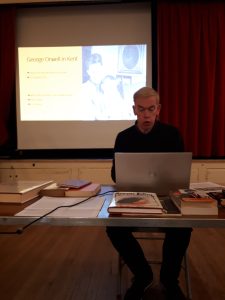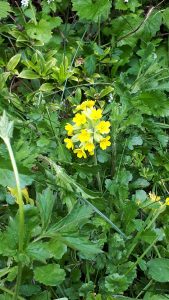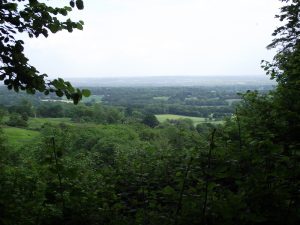George Orwell in Kent and the Old Sundridge Hospital,
19th October, 2022

Neil Smith from The Orwell Society
The Ide Hill Society’s first autumn meeting was a talk entitled: George Orwell in Kent and the Old Sundridge Hospital. The evening was a great success with the village hall filled with over 40 people some of whom were new faces. Unusually, it was a meeting with three speakers – Neil Smith from The Orwell Society, Liz Gandon a well-known local resident, and Mike Bolton a local historian.
Neil Smith provided us with an excellent PowerPoint presentation which included maps, photographs and historical details. He briefly outlined Orwell’s life – his rather privileged early life (Eton educated); his ambition, expressed at a very young age, to become a writer; his decision to go ‘down and out’; his family life and his very premature death at the age of only 46 in 1950. Orwell was in fact the writer’s pen name, his real name being Eric Blair. As Neil suggested had he continued to use his real name we would now be using the term ‘Blairite’ rather than ‘Orwellian’!
Orwell’s decision to live rough had been based on the hope that it would provide him with subject matter for his writing. So, between 1927 and 1930 he began to regularly join the tramps in the London area, whilst trying to get his work published. Eventually, this paid off for in the following year he had an essay published that recorded his experience of hop-picking throughout Kent: Hop-picking (1931).
Neil’s main focus for the evening’s talk was Orwell’s connections to Kent and for this he mainly referenced Orwell’s Hop-picking Diary (first published in 1968) which documented the journey he had taken through the county in 1931. He had begun at the Elephant and Castle and continued all the way to Wateringbury in Kent, with a stopover in Ide Hill, the details of which were of particular interest for our audience. Neil pointed out that both the hop-picking essay and the diary could be read online for free at: www.orwellfoundation.com
Orwell’s first full work: Down and Out in Paris and London (published 1933), had included some unflattering references to Ide Hill:
‘I turned north for London. Most of the others (tramps) were going on to Ide Hill, said to be about the worse spike in England.’
‘(the tramps) warned me to steer clear of…Ide Hill…’
He does add a conciliatory note: ‘I have been to it since, and it is not too bad’.
The ‘spike’ he refers to formed a part of the workhouse which provided tramps with one night’s accommodation in the casual ward. Mike Bolton, a local historian, gave us a brief history of that institution that stood at the junction of New Road with Sundridge Road, where it still stands today, although it is no longer used as a workhouse. Although Orwell referred to it as the Ide Hill ‘spike’ Mike confirmed it was officially the Sevenoaks Union Workhouse and had been built between 1844 and 1845, shortly after the 1834 Act, on land which was a part of the Amherst estate. It was a grim intimidating place, almost akin to a prison. The inmates didn’t even escape on death, as many were buried in a communal grave in the grounds.
The workhouse subsequently became the Sundridge Hospital catering for what were known at the time as psychogeriatric patients, now correctly termed long stay elderly infirm. This hospital eventually closed in 1988 and fell into disrepair before being converted, whilst maintaining its Grade II Listed status, into a residential development (Birchfield).
When Orwell and Ginger arrived at the Ide Hill ‘spike’ in 1931, they found the Tramp Major very unwelcoming and therefore decided to move on. Orwell records in his diary that they continued up the road to Ide Hill village where they had sausages for supper:
‘… Ginger tapped the local butcher, who gave us the best part of two pounds of sausages…Ginger and I went and kipped on the edge of the park near the church. It was beastly cold, but a little better than the night before, for we had plenty of wood and could make a fire.’
‘The next morning the clergyman…caught us and turned us out, though not very disagreeably.’
Liz Gandon provided some insight into the probable location for the ‘park’ illustrating the site with a map of the churchyard as it appeared at that date. It seems likely that Orwell and Ginger put their heads down in a section of the churchyard that was at that time relatively devoid of graves to the right of the church as you approach the porch. Their proximity to the vicarage made their discovery by the vicar in the morning almost inevitable.
Underwood’s, the village butcher in 1931, was located in what is now the garage of Prospect House and this was where they received their gift of sausages. Freda Leigh (born 1922), who sadly died this summer, recalled moving to Prospect House in 1934 and spoke of the ‘tramps’ that would often call at her family’s front gate to have their drums filled as they passed through the village.
It seems that Orwell and Ginger were dealt with pretty generously as they passed through our village both by the butcher and the vicar!
The meeting closed with questions and time was allowed for the audience to browse through Orwell’s many other publications, alongside other relevant material regarding the Orwell Society which Neil had kindly brought for us to see. It was a memorable evening!
To find out more about The Orwell Society go to: www.orwellsociety.com
Maggie Palmer
Ide Hill Society


